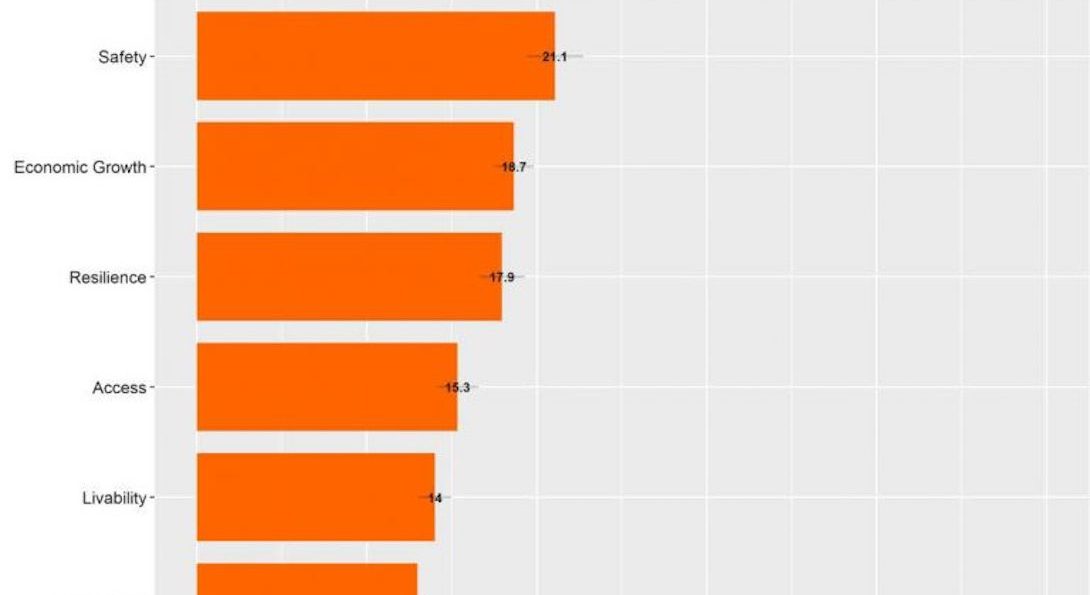IDOT Employs Innovative Approach to Identify Public Priorities

This spring researchers at the University of Illinois at Chicago (UIC) used an innovative web platform to conduct a survey that allowed residents across Illinois to share their priorities for the transportation system in Illinois in a new way. Results show that safety and economic development are top priorities statewide and include rankings of over 100 transportation ideas – the majority submitted by the public – based on voting by a representative group of Illinois residents.
The new approach has exciting potential for public agencies and organizations that seek to increase the quantity and quality of the feedback and ideas they receive from the public. The Illinois Department of Transportation (IDOT) commissioned the Institute for Policy and Civic Engagement and the Urban Transportation Center to conduct the survey to expand its outreach to Illinois residents in advance of its 2017 Long Range Transportation Plan.
In order to identify the best ideas from Illinois residents, researchers employed an open-source wiki survey platform called All Our Ideas (AOI), which allowed residents to choose between a pair of ideas randomly selected from an idea bank in response to the question, “Which idea is more important for transportation in Illinois?” Participants also were encouraged to submit their own ideas to be included in the idea bank and voted on by others.
Though simple and engaging, this format avoids many common pitfalls of online engagement tools by featuring the open collaboration of wiki platforms while maximizing public input and resisting vote manipulation. All Our Ideas was developed at Princeton University and has been used by the New York City Mayor’s Office, the United Nations and other organizations large and small.
Researchers utilized the AOI platform in a two-phase process that first focused on generating high-quality ideas from the public and then had a representative sample of Illinois residents vote on those ideas so that the results reflect the opinions of all Illinois residents. In the first phase, 322 ideas were submitted by the public and 121 were entered into the idea bank, along with 64 IDOT ideas, to be randomly-selected for participants to vote on. Overall, over 800 participants voted 36,353 times during this phase, which provided a robust idea bank for use in phase two.
For phase two, researchers partnered with research firm YouGov to identify two statistically representative groups of 500 Illinois residents – 500 within IDOT Region 1 (comprised of metropolitan Chicago and Northeast Illinois) and 500 in Regions 2-9 (the rest of Illinois). These 1,000 residents then completed a similar process of voting on ideas to participants in phase one, though they could not add their own ideas. Through this approach to public engagement, IDOT was able to gather diverse and representative transportation insight from Illinois residents.
Of the top 10 ideas, five were public ideas and five were “seed ideas” submitted by IDOT. In general, ideas related to road networks and repair ranked the highest. The highest-ranking idea was: “Increase road repairs that are in desperate need of repair now before creating new highway accesses.” The idea with the biggest difference in ranking between regions was “IDOT’s ability to advocate for sound transportation policy and funding,” which residents in Regions 2-9 prioritized much more highly (ranked 21st) than residents in Region 1 (114th). When comparing regions, residents in Regions 2-9 were more likely to prioritize ideas related to rural highways, roadway freight, and safety. Region 1 residents, on the contrary, were more likely to prioritize ideas related to public transit (buses, trains and rail) and bikes and pedestrians.
In a second component of phase two, participants prioritized transportation goals and modes. In this component, participants indicated their highest priority goals are safety and economic development and their highest priority modes are the road network and public transit.
The All Our Ideas platform has broad application to public agencies and organizations interested in engaging with the residents of Illinois. It is open-source, free to use, and has low barriers to entry. It is focused on discovering the public’s ideas, no matter who submits them, and democratic, since each person’s votes count the same regardless of wealth or political influence. In the current era of political polarization, this public-driven process encourages residents to interact with each other about ideas and policy rather than politics
The UIC researchers compiled their findings in a report, “A New Approach to Public Engagement: Capturing Better Ideas and Representative Priorities from the Public for the Illinois Department of Transportation.” Visit this page to view and abstract.
The Institute for Policy and Civic Engagement (IPCE) focuses on transforming democracy by creating a more fully engaged citizenry with more effective leaders. As a catalyst for learning and action, the Institute creates opportunities for scholars, concerned citizens, students, and government officials to actively participate in social discourse, research, and educational programs on policy issues and social trends.